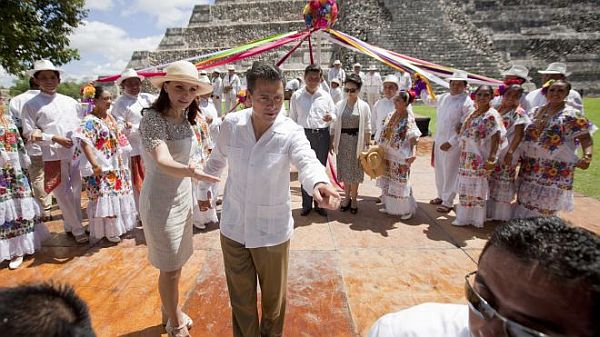Mexico City, Mexico - Now the world's second-largest economy, the rapid growth of China in recent years has impressed many, including some Mexicans who see China as a positive example for Mexico. The recent visit of Chinese Paramount leader Xi Jinping to Mexico brings into focus the state of China in the world today and its relations with Mexico.
China now has the world's second-largest economy, after the United States. In six of the past ten years, China's economic growth has surpassed 10%.
Mexico and China are trading partners, but their relationship is quite lopsided. Just like its neighbor to the north, Mexico has a big trade deficit with China, and some Mexicans accuse the Asian giant of unfair trading practices.
Last year, China exported $57 billion in products to Mexico, while Mexico only exported 5.7 billion to China.
Part of the problem is that manufacturing wages are lower in China than in Mexico, although the gap has been narrowing. In 2000, the average manufacturing wage in dollars per hour was 1.5 in Mexico and 0.3 in China. In 2005 it was 1.9 in Mexico, 0.6 in China. In 2011 it was 2.1 in Mexico and 1.6 in China. To further complicate matters, some Chinese exports to Mexico are now re-exported to the United States.
As far as using China as an example for Mexico to follow, that might or might not work depending on the particular policy being emulated.
Plus, it's pertinent to point out that, although China's economy is much bigger than that of Mexico, per capita income and standard of living is higher in Mexico.
As leader of China, Xi Jinping has several official titles: General Secretary of the Communist Party of China, President of the People's Republic of China, Chairman of the Central Military Commission as well as being a member of the CPC Politburo Standing Committee, China's highest decision-making collective.
Xi Jinping's visit to Mexico was part of a four-nation trip to the Western hemisphere, and he brought along his wife Peng Liyuan. Four countries were visited: Trinidad and Tobago, Costa Rica, Mexico and the California in the United States.
During his visit to the island of Trinidad, Xi met not only with the Prime Minister of Trinidad and Tobago, but with the leaders of Jamaica, the Bahamas, Antigua and Barbuda, Barbados, Dominica, Grenada, Guyana and Surinam. All of those nations have relations with China and not Taiwan. Uninvited were Haiti, the Dominican Republic, Saint Kitts and Nevis, Saint Lucia, and Saint Vincent and the Grenadines, the five Caribbean nations that have diplomatic relations with Taiwan.
Xi next visited Costa Rica where he signed nine trade deals with the Central American country. Costa Rica is the only Central American nation that has diplomatic relations with China.
The other nations (Belize, Guatemala, El Salvador, Honduras, Nicaragua and Panama) have diplomatic relations with Taiwan, as did Costa Rica until 2007, when it switched from Taiwan to China. (Although Nicaragua still has diplomatic relations with Taiwan, it just made a deal with China giving it rights to build a new canal through Nicaragua.)
Xi Jinping arrived to Mexico on June 4th, where he was received by President Pena Nieto with much fanfare in Mexico City, where the Chinese leader spoke to Mexico's Congress. During the visit, various agreements were announced, including the opening of tequila markets in China, scholarships for Mexican students to study in China, and the opening of cultural and educational centers in both China and Mexico, as well as the promotion of tourism between both nations.
It was also announced that the Chinese ban on Mexican pork was lifted. This ban had been in effect since 2011, when then-President Calderon angered China by meeting with the Dalai Lama. This might be an indication that the Pena Nieto administration is not going to speak out against Chinese policy in Tibet.
Mexico and China have also agreed to work out textile disputes.
On June 6th, the two presidents and their wives visited the Maya ruins of Chichen Itza in the Yucatan Peninsula.
The two leaders' wives have something in common as both were famous before marrying their respective husbands.
Peng Liyuan was a famous singer in China, and Angelica Rivera was famous as a telenovela star, especially for her role as Gaviota in Destilando Amor.
In fact, the Destilando Amor program was actually aired in China, giving Angelica Rivera a certain recognition factor in that country.
Peng Liyuan is a fan of Mexican telenovelas and during her visit to Mexico, Angelica Rivera took her on a tour to the Televisa studies, where she was able to watch the actual filming of a current production.
For more on telenovelas and their exportation to China, see my 2007 article 'Mexican "Telenovelas" a Big Hit in China'.
Allan Wall, an American citizen who recently moved back to the U.S. after living in Mexico for a decade and a half, continues writing articles about various aspects of Mexico and Mexican society.Click HERE for more articles by Allan Wall.



